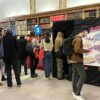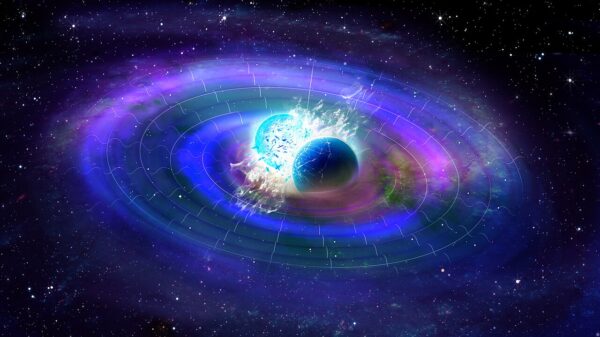Science and Research Correspondent Jana Bazeed interviews particle physicist and King’s professor Dr. Teppei Katori, the first speaker of the yearly Maxwell Lectures.
The much anticipated Maxwell Lectures are back, with the first talk taking place on Tuesday, November 15th. The talk was delivered by experimental particle physicist Dr. Teppei Katori, a member of King’s College London’s Experimental Particle & Astroparticle Physics (EPAP) group. In the lead up to the talk, Roar sat down with Dr. Katori for a quick chat about his research and talk.
Background
The Maxwell Lectures are a series of talks given by members of the scientific community to promote current research, industry advancements and science communication. These have been hosted by KCL’s very own Maxwell Society (the Physics Department’s student society) since the 1950’s, and have welcomed acclaimed international researchers such as Prof. Jim Al-Khalili, Prof. Sean Carroll and Dame Jocelyn Bell-Burnell over the years.
For the first talk in this year’s series, Dr. Katori was invited to talk about neutrinos and the origins of matter and of spacetime, introducing recent developments in the field and the groundbreaking research being conducted by the EPAP group at King’s. His main focus is neutrino physics, understanding the properties of neutrinos and using neutrinos as tools to search for new physics.
Travelling at near lightspeeds, Neutrinos are small, nearly massless subatomic particles with (as the name suggests) neutral charges. Despite being the second most abundant elementary particles, neutrinos remain quite a mystery. Yet, scientists believe they may just hold the answers to some of our biggest questions about the universe.
Why neutrinos?
In the grand scheme of things, neutrino physics is still a relatively new field, with lots of answers waiting to be uncovered.
“I’ve been working on neutrinos for almost entire my career, so since my PhD–so I’ve been doing this for like 20 years”, Dr. Tappei continues, “[the field] is new and new results were coming and, many mysterious results were coming […] with lots of data, people didn’t understand it. Many people thought that’s it’s kind of the future because it’s a new field and there lots of a new discovery and lots of excitement.”
Dr. Katori research covers a vast range of topics, one of those being the study of neutrino interactions.
“[Neutrino interactions] basically means how neutrinos collide with a nucleus, and then what happens after.” He states that,”Neutrinos are invisible, so the only way to see a neutron is to see the particle made by the neutrino colliding with atoms. But to do this, you have to understand how neutrinos collide. […] Using this information then you can kind of retrieve information on neutrinos.” Dr. Katori adds, “understanding how neutrinos collide is fundamental to understanding neutrinos themselves.”
Another area of interest for Dr. Katori is using neutrinos to look for new physics, especially with space-time structure, via the IceCube project.
“[Neutrinos] propagate, you know, in like a billion light years. So if something wrong in the space time, there’s a chance neutrinos pick it up and that affects how the neutrino flavor types convert. […] So we monitor this, flavor conversion of astrophysical neutrinos to look for some new physics.”
A paper of his was recently published by King’s on this matter.
Dr. Katori hopes this research could help shed light on some of the most pressing questions in modern science:
“[Understanding neutrinos] could be a way to understand all of the most important fundamental questions: the whys of matter and the origin of space-time”.
Neutrinos, Uncovering the Origins of Matter and Spacetime.
During his Maxwell Lectures talk, Dr. Katori aimed to introduce how neutrinos could provide answers to these “big questions” by discussing interesting questions about the matter-antimatter asymmetry problem, and ongoing projects like the T2K experiment and upcoming Hyper-Kamiokande project in Japan. These are key projects in the search for new physics, which scientists hope may provide some explanations for the existence of our universe.
When asked about what he hoped people’s main takeaway would be, Dr. Katori exclaimed: “It’s just exciting things!”. He then continued, explaining how he wants people to be able to get a better grasp of how these interesting processes work, “since I’m experimentalist, I also want to emphasize, you know, these kind of intangible ideas like space time or neutrinos right? But it’s all connected somehow, right? […] So I want to [explain] how this kind of process works so that the people can feel it their connection with it, I guess.”
“Don’t ask, just do it.”
From starting out in Japan, to completing his PhD in the United States, and now working in the UK, Dr. Katori had some interesting advice for aspiring physicists:
“So I [have] seen some difference[s] between the British student and American student, […] lots of British students are bit shy, and that’s not good!” He started with: “One: nobody cares about your grade, alright? Nobody, absolutely nobody cares about your grade. So don’t worry too much. And two: don’t ask it, just do it. Don’t ask for permission to do anything. Just do!”
Closing Remarks
We asked Dr. Katori for any final remarks he had to say to Roar readers.
“The particle shrine. Yeah. Please stop by!” urged Dr. Katori excitedly. The Particle Shrine is a part of the Testing Ground, Science Gallery London’s latest exhibition.
"Particle Shrine", an art-science installation by @TeppeiKatori and @ChristoSquier about cosmic ray physics appears in the latest BBC Click. No worries if haven't seen it yet, he show will last until Feb. 2023! Read more from @KingsNMES : https://t.co/GGNC8ltOPp https://t.co/Y4GYgHXAqX
— KCL Experimental Particle & Astroparticle Physics (@KingsEPAP) November 8, 2022
He then continued about the EPAP group’s ongoing projects:
“We are working on many projects, but I think if I had to say one project, which is the Hyper-Kamiokande , which has been a very huge effort for all the group’s members. So, you know, please keep eyes on its developments”
The first Maxwell Lectures Talk was held on Tuesday, 15 Nov 2022 at 18:30 GMT. Please check the Maxwell Society’s Instagram page (@maxwellsociety) for details and updates on upcoming talks and events.



















